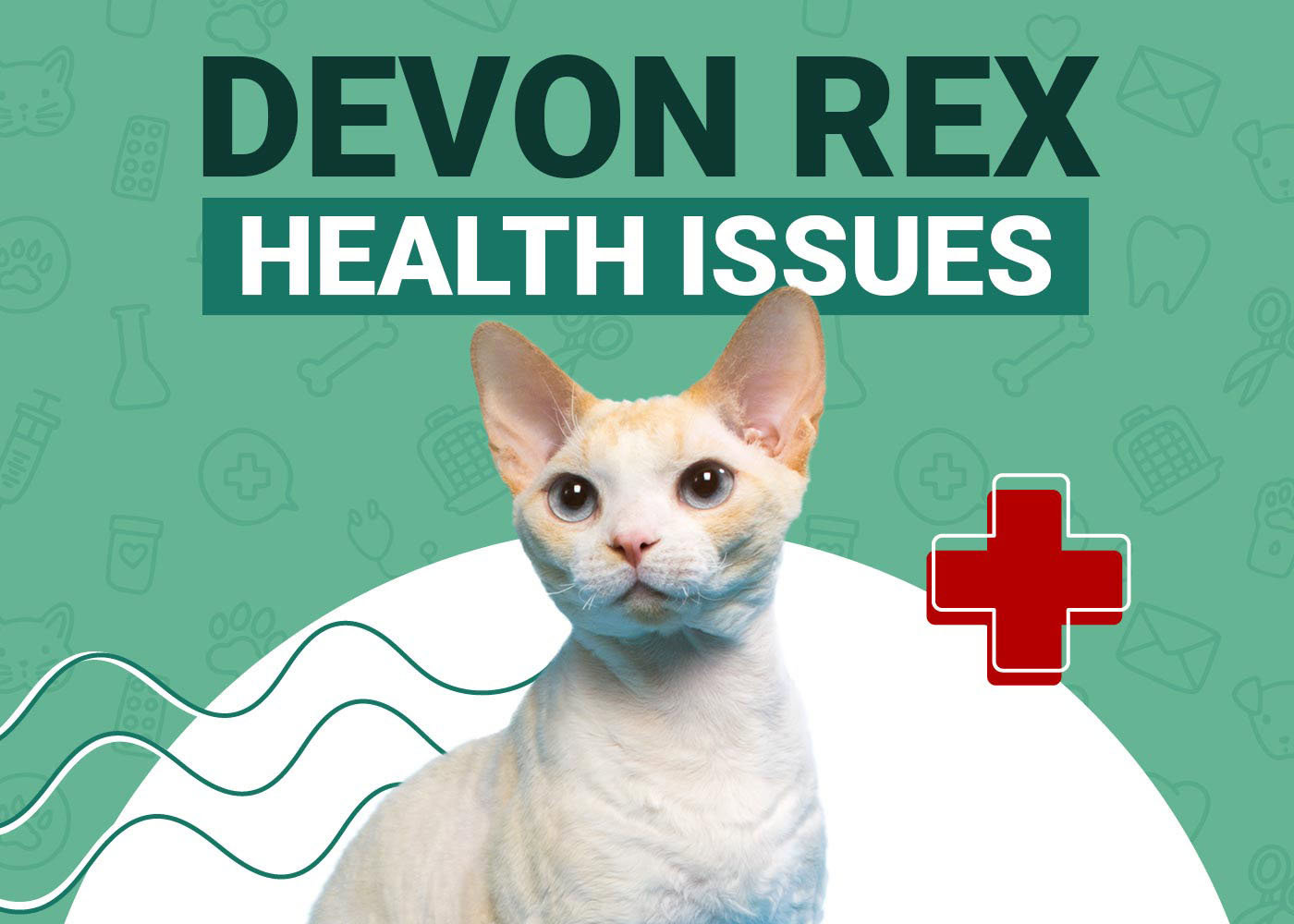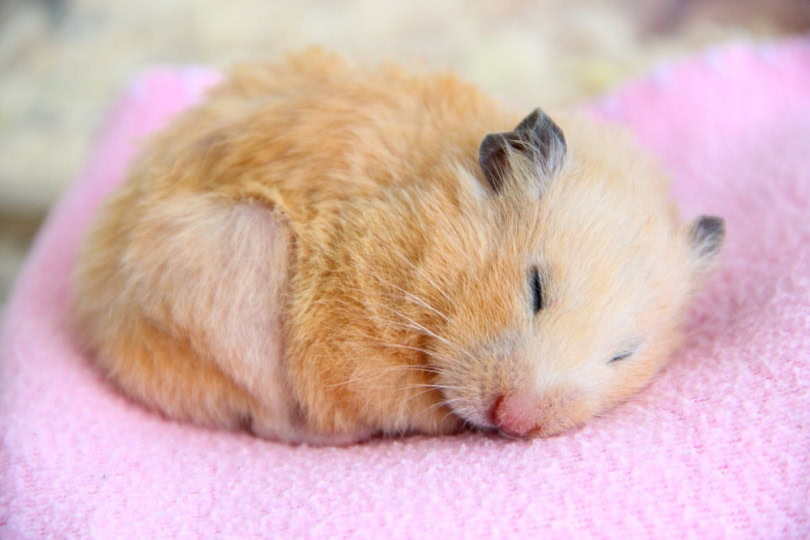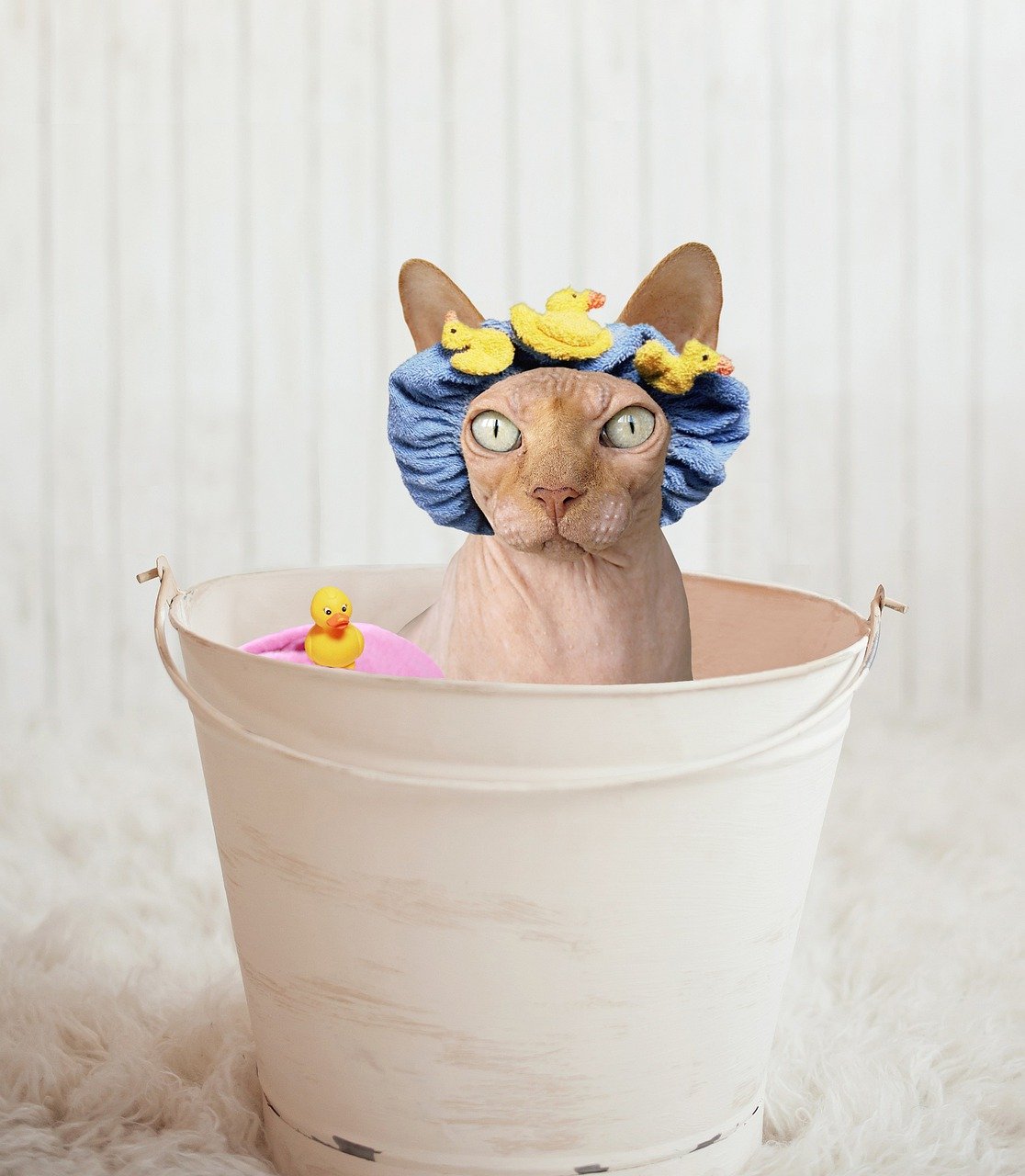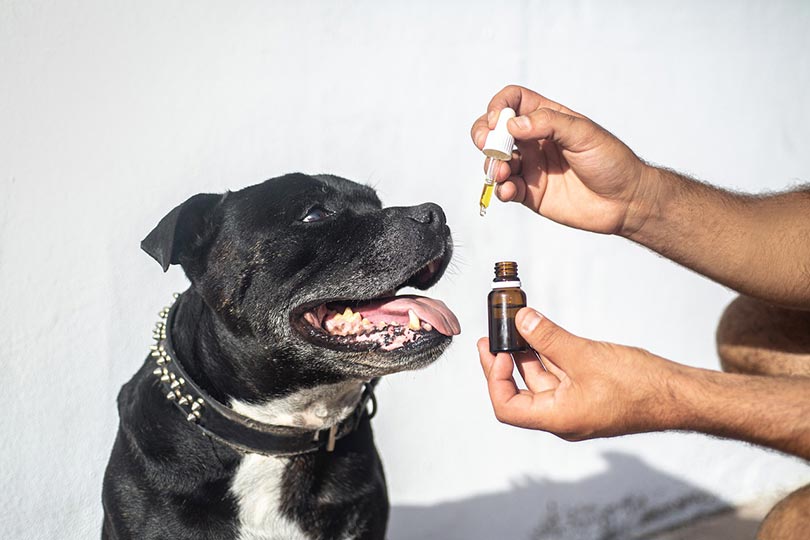VET APPROVED

The information is current and up-to-date in accordance with the latest veterinarian research.
Learn more »If you’re ready to get a new cat, you’re probably researching several breeds to find the one you want. Maybe you’ve looked into the Devon Rex (and if not, you should!). These adorable cats are on the small side, muscular, and sometimes compared to pixies (both because of their looks and mischievous personalities). This cat breed is active, curious, and friendly and does well in busy households.
But before you get a new cat, you must know more about their personality and activity levels. You also need to be aware of any common health problems, and we’ve pulled together this list of the most common health concerns Devon Rex owners might encounter. Take a look at what you should know before getting a Devon Rex!

The 14 Common Devon Rex Cat Health Problems
1. Amyloidosis
This unusual health concern happens when amyloids, a type of protein, build up inside the organs and tissues. The result is organ and tissue dysfunction, but the kidneys are affected more. Amyloidosis can also affect the liver and pancreas. If not treated, it can eventually lead to organ failure.
Though there is no cure for amyloidosis at the moment, there are ways to manage it if detected early. Amyloidosis is uncommon but occurs slightly more often in Devon Rexes and some other breeds.
- Lethargy
- Loss of appetite
- Weight loss
- Drinking more
- Diarrhea
- Vomiting
- Build-up of fluid
- Ulcers in the mouth
- Hemorrhages
- Blood clots
- Weakness in the legs
- Pale gums
- Rapid breathing
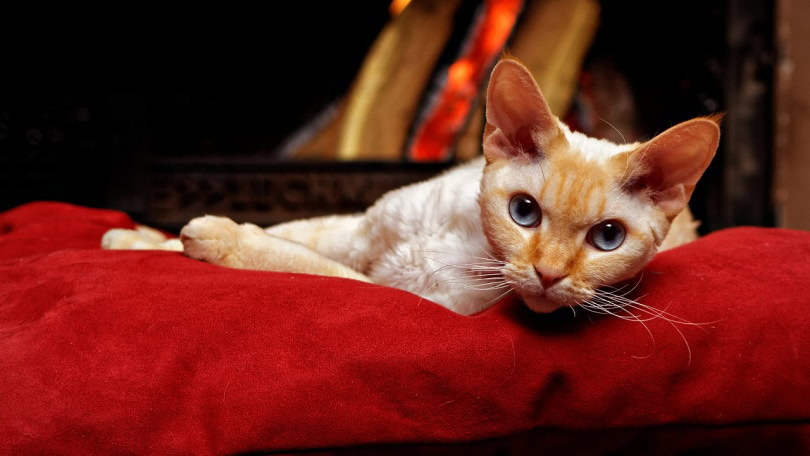
2. Arterial Thromboembolism
If your Devon Rex is already dealing with heart disease, they could end up with blood clots in their arteries. Most often, these blood clots get lodged past the aorta, which is responsible for blood going from the heart to the body.
Arterial thromboembolism is life-threatening, so if you think your cat is affected, you should take them to a vet immediately. When caught in time, your pet should be able to recover. If your cat has already been diagnosed with heart disease, medication to prevent blood clots may also be given.
- Extreme pain and distress
- Hind legs becoming cold
- Hind legs becoming paralyzed
- Breathing difficulties
3. Deafness
Devon Rexes are more susceptible to congenital deafness. White cats of any breed—particularly those with blue eyes—are more prone to deafness because of a dominant white (W) gene. They don’t have to be completely white to have this increased risk; they may be white with colored spots.
These cats are also more likely to have been born hard of hearing or deaf. If your cat doesn’t hear you (and isn’t ignoring you on purpose), make an appointment with your vet. There’s a chance it could simply be an ear infection that can easily be cleared up. Unfortunately, there’s no way to cure deafness in cats, but as long as a deaf cat is kept indoors, they should be healthy and happy.
- Not responding to sounds around them
- Not waking up or being startled by loud noises
- Sleeping more often
- Meowing more loudly
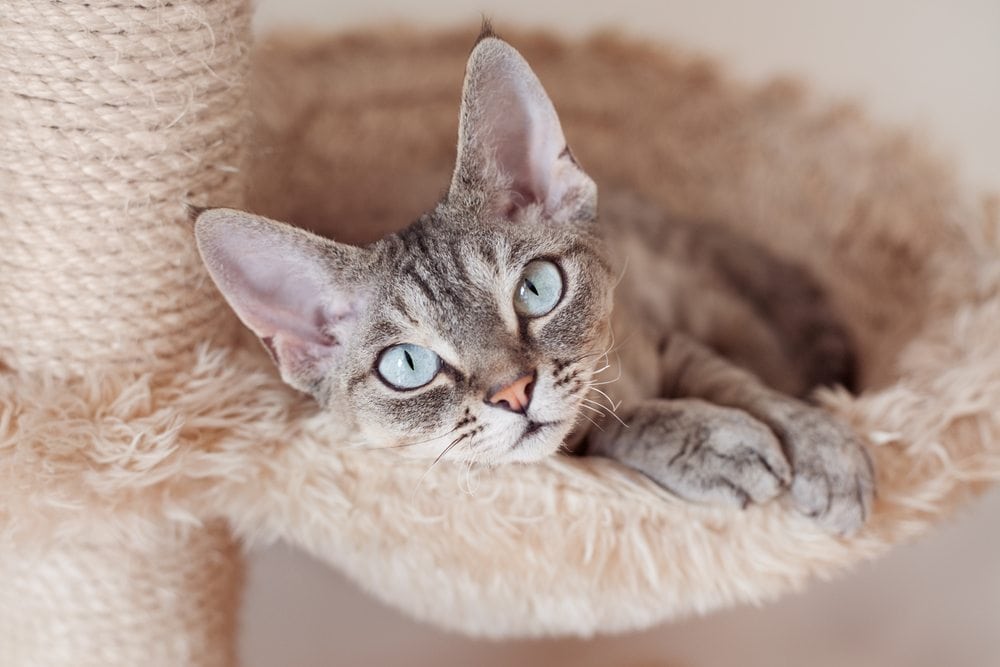
4. Dental Disease
This is not specific to Devon Rex but is a common problem in all cats. Brushing a cat’s teeth isn’t something many pet owners are willing to do often (those teeth are sharp, after all!). Unfortunately, a lack of dental care can lead to infections and tooth loss.
Advanced dental disease can result in your pet losing teeth or even having organ damage. If you cannot brush your cat’s teeth, you can get your vet or a groomer to do the job. It’s best to have your vet check your pet’s teeth at least once a year.
- Inflammation
- Gum recession
- Gingivitis
- Loss of teeth
5. Hereditary Myopathy
Hereditary myopathy or congenital myasthenic syndrome is, as the name suggests, an inherited disease. It’s inherited as an autosomal recessive trait and usually shows up in the Devon Rex anywhere between the ages of 3 weeks to 6 months. Myopathy is caused when the mechanism in the body that transmits signals from the nerves to the body is defective.
The result is generalized muscle weakness problems, and there is no treatment. The illness may stabilize, but it can also be fatal for some cats. If you’re getting your Devon Rex from a breeder, you’ll want to ensure that their cats have been tested for hereditary myopathy.
- Inability to walk or exercise
- Easily tired
- Muscle tremors
- Difficulty keeping the head in the proper position
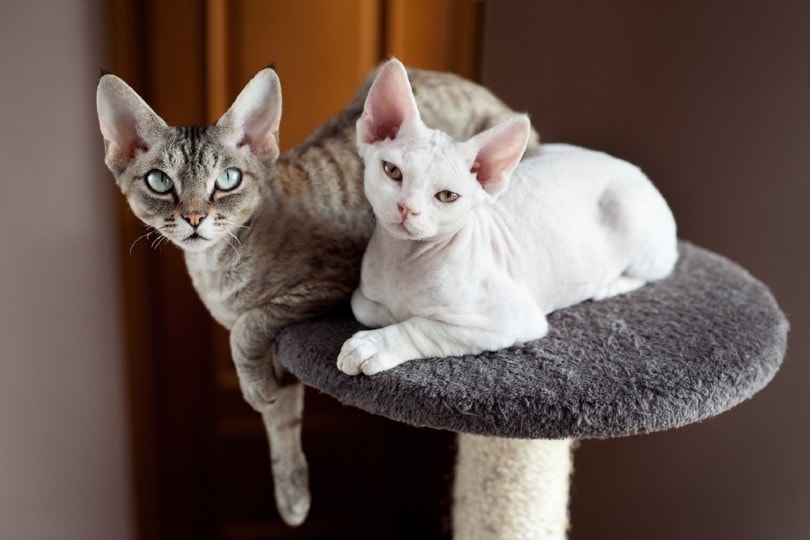
6. Hip Dysplasia
Though hip dysplasia is more commonly seen in dogs, the Devon Rex is prone to it. This multifactorial disease causes the hip joints to develop incorrectly, which makes walking and movement more difficult for your pet as they age.
To catch the problem early, you should have your pet’s hips X-rayed when they are spayed or neutered. If you’re getting your Devon Rex from a breeder, ensure they test their cats for hip dysplasia.
- Difficulty running or jumping
- Hesitance when rising from a prone position
- Excessive grooming or chewing around the hips
7. Hypertrophic Cardiomyopathy
Hypertrophic cardiomyopathy is the most diagnosed heart disease in cats, but the Devon Rex is a bit more prone to it. This genetic disease causes thickening in the heart muscle, which leads to higher pressure in the heart. In turn, it can lead to congestive heart failure or blood clots.
There isn’t a cure for hypertrophic cardiomyopathy, but it can be treated by controlling the heart rate and decreasing the chances of clots. When buying from a breeder, checking if the parent cats have been tested for this disease is vital.
Symptoms of hypertrophic cardiomyopathy vary by cat, and often, cats may be asymptomatic for years.
- Lethargy
- Difficulty breathing
- Sudden death
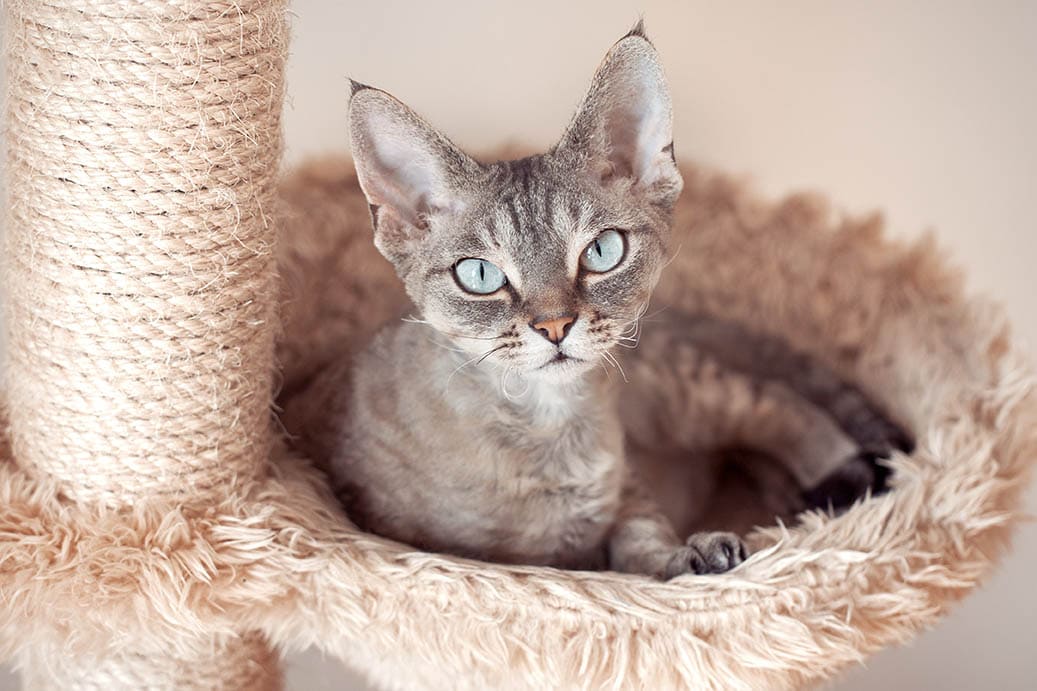
8. Hypokalaemia
Burmese Hypokalemia is an inherited condition that affects Devon Rexes. It results in low circulating potassium levels, leading to weak muscles. It is usually diagnosed when kittens are 2 to 6 months old. Supportive treatment for affected kittens will be needed.
- Difficulty walking, crouched gait
- Lowered head due to weak neck
- Tremor
9. Hypotrichosis
Hypotrichosis is less severe than other health concerns on this list; it’s a defect due to a recessive gene that causes thin hair and balding, but it can still cause issues for your Devon Rex if you aren’t careful. The thin hair and balding don’t harm your cat, but their skin needs to be well-protected.
For example, if your Devon Rex plays outside, they’re more likely to get sunburned. There isn’t a treatment for hypotrichosis, but it can be easily managed with proper attention.
- Bald spots
- Less hair than other cat breeds
- Thickened skin
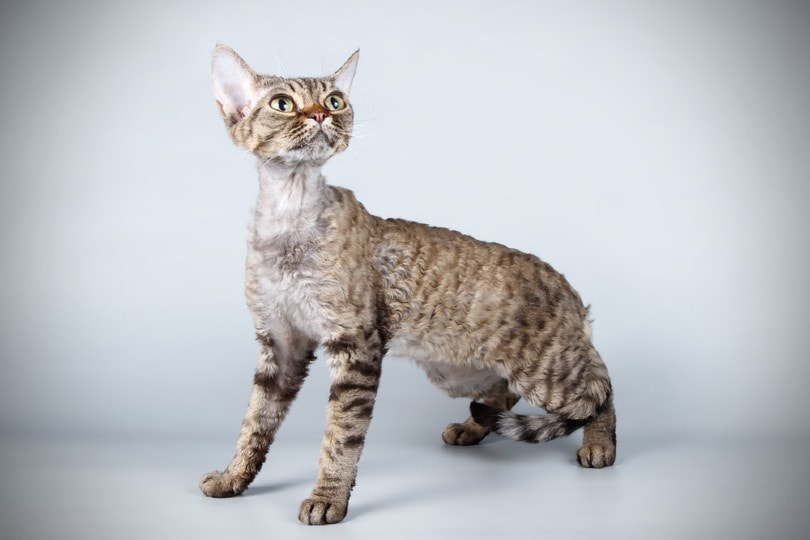
10. Obesity
In North America, obesity is one of the most easily prevented diseases in cats. Your Devon Rex isn’t necessarily more likely to be obese than other cats, but obesity in cats is entirely too common, so it’s something to watch.
Obesity can lead to other diseases, such as diabetes, and shorten their lifespan. To prevent obesity in your pet, contact a vet to ensure they aren’t eating more than they should and getting enough exercise each day.
- Visible weight gain
- Difficulty jumping
- Unwilling to move around
- Gassy
- Unkempt coat
11. Patellar Luxation
The knee joint is incredibly important for cats since it enables them to jump, crouch, and pounce. Sometimes, a cat will have what’s known as a luxating patella or a kneecap that keeps slipping out of place because of a knee joint that didn’t develop as it should.
Although it can happen to any cat, the Devon Rex has a genetic predisposition for it. If you catch it early, your cat can do physical therapy to improve the muscles and reduce the impact of this problem. Corrective surgery is an option for some cats.
- On and off lameness
- A skip in the step
- A leg that kicks to the side
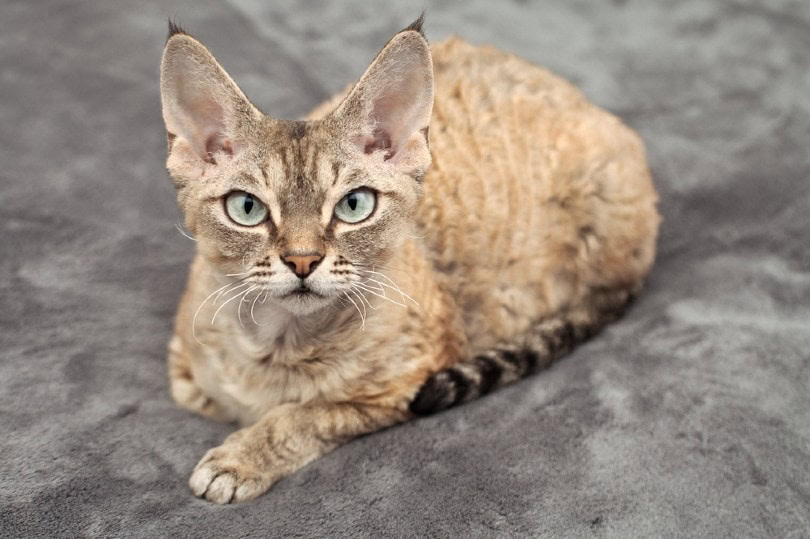
12. Papular eosinophilic/mastocytic dermatitis
This skin disease can cause your Devon Rex to break out with little, itchy, red bumps. Though it’s not known why papular mastocytic dermatitis or urticaria pigmentosa occurs in cats, it’s suspected the reason is similar to why it happens in humans—a build-up of defective mast cells (a type of immune cell). It’s also believed the condition is genetic. Though rare, it can be treated with supplements and antihistamines.
- Red bumps
- Itchiness
13. Polycystic Kidney Disease
This is an inherited condition that is common in several breeds of cats, and Devon Rexes are at moderate risk. It results in numerous cysts in the kidney tissues and, eventually, kidney failure. A genetic test is available, so make sure your Devon Rex is tested. An international PKD negative register can be consulted.
- Increased thirst
- Increased urination
- Weight loss
- Reduced appetite
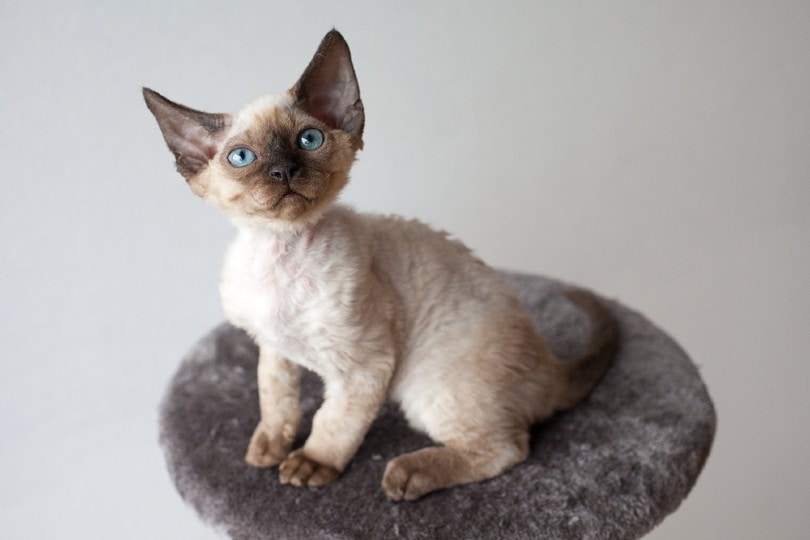
14. Vitamin K-dependent Coagulopathy
Vitamin K-dependent coagulopathy results in a lack of ability to clot the blood. Blood clotting is how bleeding eventually stops when a cat gets a cut or injury. However, cats such as the Devon Rex rarely lack the enzyme that absorbs vitamin K—the vitamin the liver needs to produce coagulants.
Once the disease is diagnosed, it’s easy enough to treat; you just need to give your cat more vitamin K in the form of supplements. However, you may not realize your pet is affected until they get injured.
- Lethargy
- Bruising
- Pale gums
- Blood in urine

Conclusion
There are several health conditions on this list, but just because the Devon Rex is prone to these, it doesn’t necessarily mean they’ll get any of them, and some are quite rare. All cat breeds are vulnerable to health problems, so don’t let this list scare you away from this beautiful breed! Now that you are well informed, you can ask breeders to show you negative test results for the inherited conditions above.
See also:
- Cat Fanciers Association
- Amyloidosis In Cats
- Today’s Veterinary Practice
- Cat Breeds With Congenital Deafness
- International Cat Care
- Universities Federation For Animal Welfare
- Scientific Reports
- Heart Of Oregon Veterinary Cardiology
- Upstate Veterinary Specialties
- National Library Of Medicine
- VCA Animal Hospitals
- Cornell Feline Health Center
- VCA Animal Hospitals
- National Library Of Medicine
- Cornell University
Featured Image Credit: Seregraff, Shutterstock
Contents
- The 14 Common Devon Rex Cat Health Problems
- 1. Amyloidosis
- 2. Arterial Thromboembolism
- 3. Deafness
- 4. Dental Disease
- 5. Hereditary Myopathy
- 6. Hip Dysplasia
- 7. Hypertrophic Cardiomyopathy
- 8. Hypokalaemia
- 9. Hypotrichosis
- 10. Obesity
- 11. Patellar Luxation
- 12. Papular eosinophilic/mastocytic dermatitis
- 13. Polycystic Kidney Disease
- 14. Vitamin K-dependent Coagulopathy
- Conclusion
